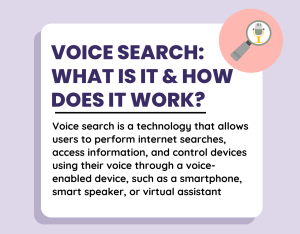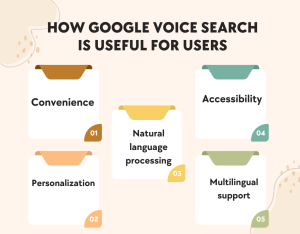to us to know how to promote business on the World Wide Web. We tell
them about different strategies that they can use different stages of their growth.
ContactUs
- +91-810-362-8856
- 106, Silver Arc Plaza, Janjeerwala Square, Indore – 452001, MP, India
-
Mon-Fri: 9am-8pm
Sat: 10am-6pm
Sun: Closed
Follow Us
How Do I Optimize My Site for Voice Search?
 Optimizing your website for voice search involves making your content more conversational and adapting to the way people naturally speak when using voice assistants like Siri, Alexa, or Google Assistant.
Optimizing your website for voice search involves making your content more conversational and adapting to the way people naturally speak when using voice assistants like Siri, Alexa, or Google Assistant.
Here are some tips to help you optimize your website for voice search:
Focus on long-tail keywords: People tend to use more conversational and natural language when using voice search. So, it’s essential to optimize your content for long-tail keywords that match the way people speak. Use tools like Google Keyword Planner, Ahrefs, or SEMrush to find relevant long-tail keywords related to your content.
Use natural language: Create content that is conversational and easy to understand. Use simple sentences, short paragraphs, and bullet points to make your content easier to read and scan.
Optimize for local search: Many people use voice search to find local businesses or services near them. So, make sure your website is optimized for local search by including your business name, address, and phone number (NAP) on your website.
Use structured data: Structured data helps search engines understand the content on your website better. Adding schema markup to your website can help improve your chances of appearing in voice search results.
Optimize for featured snippets: Voice assistants often read out featured snippets, so optimizing your content for featured snippets can increase your chances of appearing in voice search results.
Improve your website speed: Voice search users expect fast results, so it’s essential to ensure your website loads quickly. Use tools like Google PageSpeed Insights or GTmetrix to identify and fix any speed-related issues.
By following these tips, you can optimize your website for voice search and improve your chances of appearing in voice search results.
Voice Search: What Is It & How Does It Work?
 Voice search is a technology that allows users to perform internet searches, access information, and control devices using their voice through a voice-enabled device, such as a smartphone, smart speaker, or virtual assistant. Instead of typing queries into a search engine, users speak into a microphone, and the device uses speech recognition technology to understand the spoken words and interpret the user’s intent.
Voice search is a technology that allows users to perform internet searches, access information, and control devices using their voice through a voice-enabled device, such as a smartphone, smart speaker, or virtual assistant. Instead of typing queries into a search engine, users speak into a microphone, and the device uses speech recognition technology to understand the spoken words and interpret the user’s intent.
When a user speaks a query, the voice-enabled device uses natural language processing (NLP) technology to analyze the words, understand the context, and extract the relevant information. The device then sends the query to a search engine, which uses complex algorithms to find the most relevant results based on the user’s search intent, location, and other factors.
The results of the search are then displayed on the device’s screen, read out loud by a voice assistant, or both, depending on the device and the user’s preferences. Voice search also allows users to perform various actions, such as setting reminders, making calls, sending messages, playing music, and controlling smart home devices, all using voice commands.
Voice search technology works by using speech recognition and natural language processing to understand user queries, sending the queries to a search engine, and returning the most relevant results in a format that is easy for the user to consume.
How Google voice search is useful for users
 Google Voice Search is useful for users in several ways, including:
Google Voice Search is useful for users in several ways, including:
Convenience: Voice search allows users to search for information hands-free, which is especially useful when driving or multitasking. Users can perform searches and access information without having to physically interact with their devices, which can save time and improve efficiency.
Accessibility: Voice search is particularly helpful for people with disabilities or those who have difficulty typing or navigating a device’s interface. Voice search allows users to access information and control devices using their voice, making it more accessible to a wider range of users.
Natural language processing: Voice search uses natural language processing (NLP) technology to understand spoken language and interpret user intent. This means users can speak queries in a more natural, conversational manner, rather than having to type out specific search terms.
Personalization: Voice search can be personalized to individual users, allowing them to access information and perform actions using voice commands that are tailored to their preferences and behaviors. This can improve the overall user experience and make it easier for users to find what they’re looking for.
Multilingual support: Google Voice Search supports multiple languages, allowing users to search for information and access content in their preferred language. This is particularly useful for people who speak multiple languages or who are traveling to a foreign country.
In summary, Google Voice Search is useful for users because it provides convenience, accessibility, natural language processing, personalization, and multilingual support. These features allow users to access information and perform actions more efficiently and effectively, improving the overall user experience.
